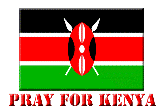ODM nominated MP and Muslim preacher, Sheikh Mohamed Dor, will become the first Imam in Kenya's Parliament.
Meanwhile, Ms Shakila Abdalla, nominated by ODM-Kenya, said her priority would be to champion the role of women in national leadership.
She said her party had followed its manifesto, which considers the marginalised.
"My first priority will be to fight for women to be in the first line of decision making at the national level," she said yesterday.
Abdalla said she would work with other Coast MPs to tackle problems in the region.
She also promised to fight drug abuse among the youth.
There are no hurdles expected as the MPs step up the power deal debate in parliament tomorrow.
However there are some faces to watch in parliament.
Hundreds of followers of the outlawed Mungiki sect staged a demonstration in Nairobi's Central Business District, where they demanded the release of their leader Maina Njenga.
It is alleged the sect enjoys high
political patronage, hence the audacity with which they emerged.
Streaming into the Central Business District in such large numbers on Wednesday, the Mungiki caused a momentary security scare, catching everyone by surprise.
Police action was delayed for a frighteningly long spell as the early morning drama unfolded.
The demonstrators, estimated to be close to 3,000, poured onto several streets waving placards bearing the portrait of their leader, Maina Njenga, who is presently languishing in jail. They insist he is innocent.
It appears the Mungiki may have taken advantage of the relocation of hawkers from the city streets to the new Muthurwa Market to mount a demonstration and pass their seemingly politically loaded message momentarily, catching police off-guard.
The Standard reliably learnt that the majority of the demonstrators were transported from Murang'a and Maragwa overnight and assembled at River Road ahead of the early morning march.
When the police finally showed up, they seemed reluctant to stop the protest. The sect members were later dispersed near the Central Police Station as they finished their protest. This was after several businesses in the city had hurriedly closed in fear of violence.
The Government has denied a BBC report indicating that the State sanctioned the recent violence in parts of the country.
The respected British broadcaster quoted sources alleging that meetings were hosted between the banned Mungiki militia and senior government figures.
"The aim was to hire them as a defence force in the Rift Valley to protect the Kikuyu community," the BBC story says.
But on Wednesday, the government called the allegations "preposterous".
A statement by Government Spokesman, Dr Alfred Mutua, said: "The Government of Kenya has been shocked by a story appearing on the BBC that alleges that members of the banned group Mungiki held meetings at State House, Nairobi, the Official Office of the President.
"No such meetings took place at State House or any government office...
Such "unfounded lies" are "injurious to the President, Government and the people of Kenya," the statement said.
A policeman who was on duty at the time, who has spoken to the BBC on condition of anonymity, has also pointed to clear signs of State complicity.
He alleges that in the hours before the violence in Nakuru, police officers had orders not to stop a convoy of minibus taxis, called "matatus", packed with men when they arrived at police checkpoints.
"When we were there... I saw about 12 of them [matatus] packed with men," he said. "There were no females... I could see they were armed. We were ordered not to stop the vehicles, to allow them to go."
Top Trimmers and Hair Removal Tools for Women in 2026
-
If shaving feels like a chore and waxing appointments feel like a
commitment, you’re not alone. The beauty industry has come a long way, and
the top trimme...
19 hours ago





No comments:
Post a Comment